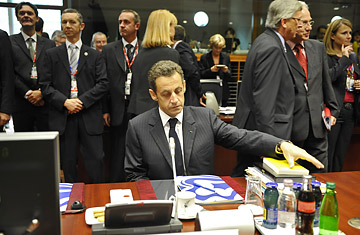
Nicolas Sarkozy sits prior to a working session of a European summit at the headquarters of the European Council in Brussels.
A week after Irish voters rejected the European Union's Lisbon Treaty, its leaders are still in a bewildered state over how to resolve their crisis.
At the E.U.'s two-day summit in Brussels, which ended on Friday, French President Nicolas Sarkozy used the treaty deadlock to say there was no point in continuing accession talks with Croatia and Turkey until the current 27 members could agree on their future. "Without the Treaty of Lisbon there won't be any enlargement," he said. "You can't say no to reforms and yes to enlargement."
The Lisbon Treaty is designed to streamline E.U. decision-making now that the club has expanded to 27 members, but the Irish referendum — the only such vote in the E.U. — has thrown the entire project in disarray.
Sarkozy and other E.U. leaders are now pinning hopes of salvaging the Treaty on another referendum, perhaps in a year's time. Officially, the bruised Irish Taoiseach (Prime Minister) Brian Cowen was treated with sympathy at the Brussels summit, and there was universal recognition that the Irish vote had to be "respected". But behind the scenes, Cowen — tellingly banished to the far end of the family photograph of E.U. leaders — was alternately cajoled and bullied to run another vote.
Yet there is no guarantee a second vote would win. The referendum got nixed thanks to a bewildering array of mostly unrelated objections, including abortion, neutrality, tax sovereignty, economic prospects, the loss of an Irish E.U. commissioner and the deregulation of the taxi trade. Indeed, an E.U. survey of 2,000 Irish "no" voters said the main reason they rejected the Treaty was that they did not understand it.
None of this makes Cowen's task any easier. He will now report back to the leaders at their October summit with either a road map charting a way out of the mess or a confirmation that another vote is pointless and the treaty must be declared dead.
But there are other options available. Ireland could be offered additional guarantees of its sovereignty. Such "explanatory protocols" would involve no changes to the treaty's text, and therefore little or no need for other governments to ratify the document. "Once re-ratification has been completed in the 26, it would be entirely appropriate for the Irish government to call for a second referendum," says Daniel Gros, Director of the Centre for European Policy Studies (CEPS). But he warned that stakes would be much higher. "This referendum would be about a different question: does Ireland wish to join the 26 with the Lisbon Treaty in force? At this point, another 'no' would effectively mean that Ireland would leave the E.U."
If that doesn't work, much of Lisbon could be imposed by stealth. Creative legal minds would ensure that the most pressing institutional changes — like an E.U. foreign minister and an "External Action Service" — are implemented without a daunting new treaty that would involve the assent of pesky voters.
Or else the E.U. could simply plow on with what it has under the existing treaties. This last option has been decried as a recipe for gridlock. Yet studies have shown that the 27 member states still function well with machinery designed for 15. Last December, Helen Wallace of the London School of Economics published research showing that E.U. enlargement has barely changed day-to-day work: the European Parliament produced as much legislation in 2006 as it did five years before, the European Commission has maintained its work rate, and there has been no significant rise in non-compliance cases at the European Court of Justice.
As for E.U. leaders, they are still capable of dealing with real-life issues, as they showed in Brussels after their recriminations over the Irish vote. They announced a relief package for farmers, fishermen and others affected by soaring oil and food prices; they agreed to scrap diplomatic sanctions against Cuba imposed in 2003; and they implicitly threatened more sanctions against Zimbabwe President Robert Mugabe's regime.
Which suggests that even without the Lisbon Treaty, reports of the E.U.'s death are somewhat premature.
